Related Research Articles
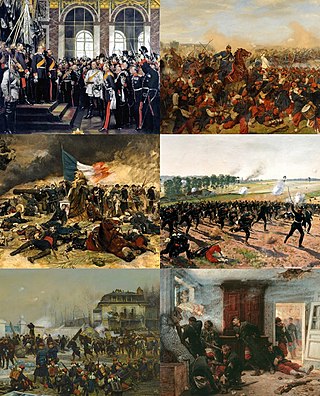
The Franco-Prussian War or Franco-German War, often referred to in France as the War of 1870, was a conflict between the Second French Empire and the North German Confederation led by the Kingdom of Prussia. Lasting from 19 July 1870 to 28 January 1871, the conflict was caused primarily by France's determination to reassert its dominant position in continental Europe, which appeared in question following the decisive Prussian victory over Austria in 1866. According to some historians, Prussian chancellor Otto von Bismarck deliberately provoked the French into declaring war on Prussia in order to induce four independent southern German states—Baden, Württemberg, Bavaria and Hesse-Darmstadt—to join the North German Confederation; other historians contend that Bismarck exploited the circumstances as they unfolded. All agree that Bismarck recognized the potential for new German alliances, given the situation as a whole.

The Napoleonic Wars (1803–1815) were a series of conflicts fought between the First French Empire under Napoleon (1804–1815) and a fluctuating array of European coalitions. The wars originated in political forces arising from the French Revolution (1789–1799) and from the French Revolutionary Wars (1792–1802), and produced a period of French domination over Continental Europe. The wars are categorised as seven conflicts, five named after the coalitions that fought Napoleon, plus two named for their respective theatres; the War of the Third Coalition, War of the Fourth Coalition, War of the Fifth Coalition, War of the Sixth Coalition, War of the Seventh Coalition, the Peninsular War, and the French invasion of Russia.

The Peninsular War (1807–1814) was the military conflict fought in the Iberian Peninsula by Spain, Portugal, and the United Kingdom against the invading and occupying forces of the First French Empire during the Napoleonic Wars. In Spain, it is considered to overlap with the Spanish War of Independence.

The Atlantic Wall was an extensive system of coastal defences and fortifications built by Nazi Germany between 1942 and 1944 along the coast of continental Europe and Scandinavia as a defence against an anticipated Allied invasion of Nazi-occupied Europe from the United Kingdom, during World War II. The manning and operation of the Atlantic Wall was administratively overseen by the German Army, with some support from Luftwaffe ground forces. The Kriegsmarine maintained a separate coastal defence network, organised into a number of sea defence zones.
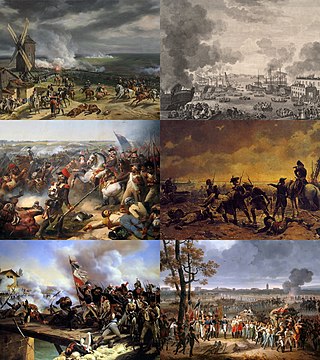
The War of the First Coalition was a set of wars that several European powers fought between 1792 and 1797, initially against the constitutional Kingdom of France and then the French Republic that succeeded it. They were only loosely allied and fought without much apparent coordination or agreement; each power had its eye on a different part of France it wanted to appropriate after a French defeat, which never occurred.
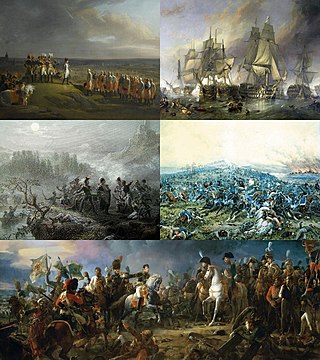
The War of the Third Coalition was a European conflict lasting from 1805 to 1806 and was the first conflict of the Napoleonic Wars. During the war, France and its client states under Napoleon I opposed an alliance, the Third Coalition, which was made up of the United Kingdom, the Austrian Empire, the Russian Empire, Naples, Sicily, and Sweden. Prussia remained neutral during the war.

The French Revolutionary Wars were a series of sweeping military conflicts resulting from the French Revolution that lasted from 1792 until 1802. They pitted France against Great Britain, Austria, Prussia, Russia, and several other countries. The wars are divided into two periods: the War of the First Coalition (1792–1797) and the War of the Second Coalition (1798–1802). Initially confined to Europe, the fighting gradually assumed a global dimension. After a decade of constant warfare and aggressive diplomacy, France had conquered territories in the Italian Peninsula, the Low Countries and the Rhineland. French success in these conflicts ensured the spread of revolutionary principles over much of Europe.

Operation Bodyguard was the code name for a World War II deception strategy employed by the Allied states before the 1944 invasion of northwest Europe. Bodyguard set out an overall stratagem for misleading the Oberkommando der Wehrmacht as to the time and place of the invasion. Planning for Bodyguard was started in 1943 by the London Controlling Section, a department of the war cabinet. They produced a draft strategy, referred to as Plan Jael, which was presented to leaders at the Tehran Conference in late November and, despite scepticism due to the failure of earlier deception strategy, approved on 6 December 1943.
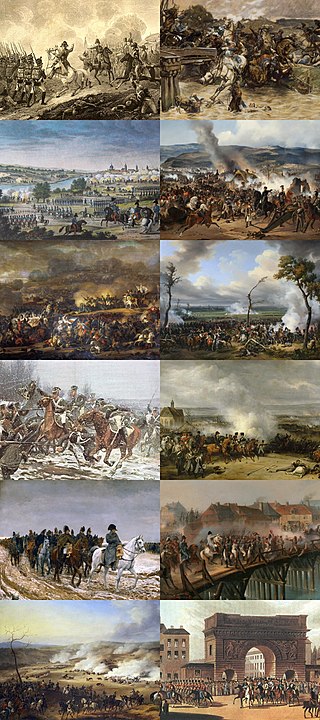
In the War of the Sixth Coalition, sometimes known in Germany as the Wars of Liberation, a coalition of Austria, Prussia, Russia, Spain, Great Britain, Portugal, Sweden, Sardinia, and a number of German States defeated France and drove Napoleon into exile on Elba. After the disastrous French invasion of Russia of 1812 in which they had been forced to support France, Prussia and Austria joined Russia, the United Kingdom, Sweden, and Portugal, and the rebels in Spain who were already at war with France.
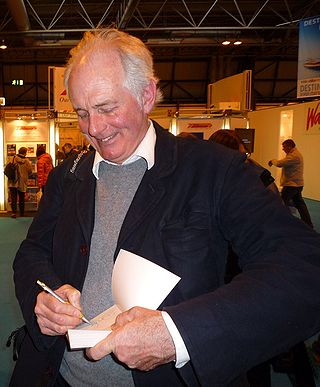
Daniel Gordon Raffan Cruickshank is a British art historian and BBC television presenter, with a special interest in the history of architecture.

Egypt is a BBC television docudrama serial portraying events in the history of Egyptology from the 18th through early 20th centuries. It originally aired on Sunday nights at 9 pm on BBC1 in 2005. The first two episodes explored the work of Howard Carter and his archaeological quest in Egypt in the early part of the twentieth century. The next two episodes focused on the eccentric explorer "The Great Belzoni" played here by Matthew Kelly. The final two episodes dramatise the discovery and deciphering of the Rosetta Stone by Jean-François Champollion.
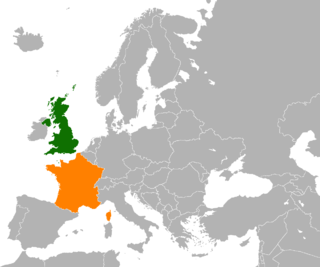
The historical ties between France and the United Kingdom, and the countries preceding them, are long and complex, including conquest, wars, and alliances at various points in history. The Roman era saw both areas largely conquered by Rome, whose fortifications largely remain in both countries to this day. The Norman conquest of England in 1066 decisively shaped the English language and led to early conflict between the two nations.
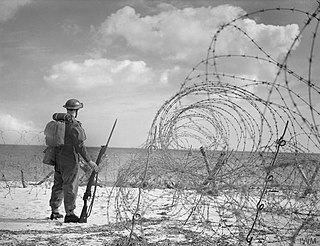
British anti-invasion preparations of the Second World War entailed a large-scale division of military and civilian mobilisation in response to the threat of invasion by German armed forces in 1940 and 1941. The British Army needed to recover from the defeat of the British Expeditionary Force in France, and 1.5 million men were enrolled as part-time soldiers in the Home Guard. The rapid construction of field fortifications transformed much of the United Kingdom, especially southern England, into a prepared battlefield. Sea Lion was never taken beyond the preliminary assembly of forces. Today, little remains of Britain's anti-invasion preparations, although reinforced concrete structures such as pillboxes and anti-tank cubes can still be commonly found, particularly in the coastal counties.

In the Blockade of Almeida a French garrison under Antoine François Brenier de Montmorand was surrounded by approximately 13,000 Anglo-Allied soldiers led by Generals Sir Alexander Campbell, 1st Baronet and Sir William Erskine, 2nd Baronet.

What the Industrial Revolution Did for Us is a BBC documentary series produced in conjunction with the Open University that examines the impact of the Industrial Revolution on modern society. It was originally broadcast on BBC Two from 7 October to 11 November 2003.
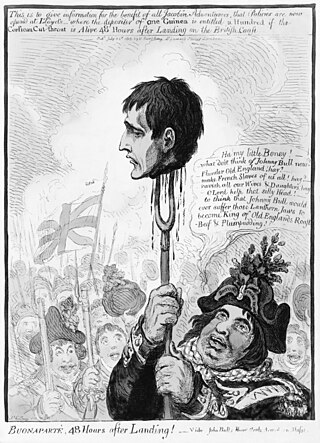
British anti-invasion preparations of 1803–05 were the military and civilian responses in the United Kingdom to Napoleon's planned invasion of the United Kingdom. They included mobilization of the population on a scale not previously attempted in Britain, with a combined military force of over 615,000 in December 1803. Much of the southern English coast was fortified, with numerous emplacements and forts built to repel the feared French landing. However, Napoleon never attempted his planned invasion and so the preparations were never put to the test.
Operation Forfar was the name given to a series of British Commando raids on the French coast during World War II. The raids were part of Operation Starkey, a military deception intended to draw out the Luftwaffe. The purpose of these raids was to identify German coastal units and to gain technical intelligence on German equipment, creating the impression of pre-invasion reconnaissance.
The Country House Revealed is a six-part BBC series first aired on BBC Two in May 2011, in which British architectural historian Dan Cruickshank visits six houses never before open to public view, and examines the lives of the families who lived there. The series was accompanied by a full-length illustrated companion book published by the BBC.

James Holland is an English historian, author and broadcaster, who specialises in the history of the Second World War.

War & Peace is a British historical drama television serial first broadcast on BBC One on 3 January 2016, produced by BBC Cymru Wales, in association with The Weinstein Company, Lookout Point and BBC Worldwide. It is a six-part adaptation of the 1869 novel War and Peace by the Russian author Leo Tolstoy, written by Andrew Davies and directed by Tom Harper. War & Peace aired on A&E, Lifetime and History Channel in the United States as four two-hour episodes, beginning on 18 January 2016. The serial stars Paul Dano, Lily James and James Norton in the leading roles.